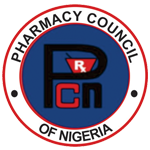PHARMACY PRACTICE IN NIGERIA
PCN is responsible for registration and licensure of all Pharmacists, Pharmaceutical Premises (Manufacturing, Importation, Distribution, Wholesale, Retail, Hospital Pharmacies) as well as issuance of Permit to Pharmacy Technicians and registration and Licensure of Patent and Proprietary Medicine Vendors.
Code of Ethics for Pharmacists
Preamble
- The Pharmacy Council of Nigeria wishes to emphasize that this “code of Ethics” is a means of assisting Pharmacists to discharge the moral and professional obligations resting upon them to observe standards of conducts appropriate to their callings.
- The code applies to all registered pharmacists holding licenses, certificates or permits under the Pharmacy Council of Nigeria Decree No. 91 of 1992, the Poison and Pharmacy Act, Cap. 535 of 1990 or any other relevant legislation regulating the handling of drugs and poisons.
- Every Registered Pharmacist must be wiling to render efficient and cost-effective professional service at all times. He must avoid any act of omission or commission, which is capable of prejudicing or impairing confidence in the Pharmacy Profession.
SECTION I
Duty to Patient and Clients
- A pharmacist should hold the health and safety of patients to be of first consideration and should provide to each patient relevant information on drugs and medicinal products;
- Any drug or medicine likely to be abused and which may be detrimental to health should not be supplied to a patient when there is no reason to believe that the drug or medicine is required for such purposes;
- A pharmacist should never condone or assist therein, the manufacture, importation, promotion, distribution, storage, sale or dispensing of drug, poisons and medicinal products which are not of good quality or which do not meet standards require by law;
- A pharmacist should respect the confidential and personal nature of his professional records. Except where the best interest of the patient requires, or the law demands, he should not disclose such information to anyone without proper patient authorization.
SECTION II
The Pharmacy
- In every pharmacy, there should be a Superintendent Pharmacists in personal control of the pharmacy. H e shall be primarily responsible for the observance of proper standards of conduct in connection with its operations.
- Every premise should reflect the professional character of a pharmacy. It should be clear to the public that the practice of pharmacy is the main business of the establishment. Signs, notices,inscriptions, wordings on business stationery and related indications should be restrained in size, design and terms. Descriptions and claim such as “Prescription Specialists”, leading drug distributors” “Top Chemists” which draw an invidious distinction between pharmacists should not be used;
- The conditions in the pharmacy should be such as to preclude the risk of error, or accidental contamination in the preparation, dispensing and supply of medicine.
SECTION III
Employment
- A pharmacist should seek at all times only fair and reasonable remuneration for his services; He should never engage in transactions with practitioners of other professions or any other person to defraud the patients;
- A pharmacist should not agree to practice under terms or conditions which tend to interfere with or impair the proper exercise of his professional judgment, and skill which tend to cause deterioration of the quality of his service, or which require him to succumb to unethical practice. He should not allow himself to be dictated to by any persons in matters affecting his professional judgment;
- A pharmacist should provide an efficient pharmaceutical service in the organization in which he carries out his professional practice. If the maintenance of this standard fails due to obstruction from employers, he should report to the Pharmacy Council of Nigeria;
- A pharmacist should at all times be ready to help other pharmacists in providing efficient pharmaceutical services. He should not condemn or run down the services offered by other pharmacists in an attempt to have advantage over his professional colleagues.Superintendent Pharmacists in wholesale establishments must ensure that all orders for the supply of drugs and medicinal products and poisons are approved and duly signed by them before such supplies are made.
- Superintendent Pharmacists of establishments which import drugs, poisons and medicinal products must be ensure that all import orders are in accordance with existing regulations before approving and duly signing them.
SECTION IV
General
(a) A pharmacist should not display any material either on the premises, in the press, or elsewhere, in connection with sale to the public of medicines or medical appliances which is undignified in style or which contain;- Any wording, design or illustration reflecting unfavorably on pharmacists collectively or upon any group of pharmacists;
- A disparaging reference direct or by implication to other suppliers, product, remedies or treatments;
- Misleading or exaggerated statements or claims, or appeal to fear;
- The word “Cure” in reference to an aliment or symptoms of ill–health or guarantee of efficacy of any product.
- A price competition or similar scheme designated to attract customers to a particular pharmacy.
b) A pharmacist should not have interest in or be associated with the conduct of Patient Medicinal Stores.
c) A pharmacist should not sell to or purchase drug poisons and medicinal products from unauthorized or illegal sources;
d) A pharmacist should always strive to perfect and enlarge his professional knowledge. He should utilize and make available this knowledge as may be required in accordance with his best professional judgment.
e) A pharmacist has the duty to observe the law, to uphold the dignity and honor of the profession and to accept its ethical principles. He should not engage in any activity that will bring discredit to the profession, and should expose without fear or favor, illegal or unethical conduct that effects the profession.



